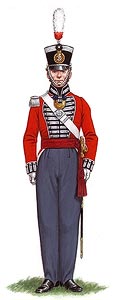Preparations for Departure
 |
| Battalion Company Officer. (Click to enlarge) |
After Napoleon’s defeat at Waterloo reductions in defence expenditure had become an urgent priority. 300,000 soldiers and sailors were discharged at short notice without compensation. The Army estimates for 1816 provided for 225,000 all ranks of which 35,000 were for Ireland and a similar number for India. In 1821, after the army of occupation had been withdrawn from France and an armed police force (the precursor of the Royal Irish Constabulary) had been formed in Ireland, the estimates provided for a Regular Army of 110,000. But at home economic difficulties provoked political unrest, abroad revolutionary talk of emancipation necessitated reinforcement of the West Indies garrison, and unrest in Burma required military intervention. As a consequence the 1825 Army estimates were for 120,000 Regular soldiers of which 25,000 were for India. In Parliament Lord Palmerston resisted any lesser provision “lest regiments which had served for twenty years abroad should once again be disappointed of relief”. He explained that at that time of 83 Infantry regiments, 51 were stationed abroad, 23 in Ireland, 4 at home and 5 on passage home.
The Queen’s Regiment returned to England from Ireland in June 1824 and was accommodated in transit barracks at Chatham. The 31st Regiment arrived back in July and disembarked at Portsmouth to occupy spare accommodation at Gosport. Recruiting for the higher India establishment, which had begun in Ireland, continued and was assisted by a recent reduction in the minimum height permitted for men to five feet seven inches. The recruiter received fifteen shillings “bringing in money” for every man that he produced. His main concern was to ensure that the physical requirements for recruits were met and he was liable to overlook indications of mental deficiency or criminal inclination. Two out of three recruits tended to be illiterate. Nevertheless many were respectable country lads, for whom there was regimental preference.
Officers needed to equip themselves for India and John Greenwood later criticised the lack of official advice for those who had not served there before. He offered some himself. For comfort on the voyage he recommended “perhaps six dozen shirts, the same number of socks, and a few dozen towels will be enough. A few can be washed on board if your man collects water in buckets whenever it rains”. And when choosing pistols be advised that “They should not be too long and heavy. Barrels should be made to pull exceedingly light, or they can never be used with accuracy. They ought to be purchased of some eminent gun maker on whose respectability dependence may be placed. Nothing of this kind should ever be selected from the stock of Birmingham rubbish often set up with German silver which outfitters are in the habit of tempting young and inexperienced persons going out”. For more information on pistols, shotguns and sporting rifles he strongly recommended Mr Greener, a gunmaker at Newcastle and a “most scientific and superior man”.
Officers expected to travel and live comfortably, and were required to do so at their own expense. Greenwood advised that “He would not recommend portable chests of drawers to be taken out. They may be purchased in Calcutta for about three pounds, equal to those which cost ten pounds at home. The bullock trunks are also made too large in England. No Indian bullock could carry them when full. Neither should expensive dressing cases, nor writing desks, be taken out. They invariably go to pieces during the hot winds. The best description of a writing desk is a portable one of Russian leather. Canteens, and portable iron bedsteads, should never be taken out. They are totally useless, and from their weight a great encumbrance; yet the outfitters will assure young officers that they are absolutely indispensable. The consequence is that nearly every ensign that joins takes out one of each, and after probably paying about as much as they originally cost for carrying them hundreds of miles about the country, finds he can never make any use of them”.
The 31st Regiment joined the Queen’s at Chatham in January 1825, having marched from Gosport. Both regiments were ready to embark for India. Many officers and soldiers saw the Thames estuary for the first time. The great mass of masts along its shores was a reminder that England was the greatest industrial and trading nation in the world despite its domestic turmoil.
Related
